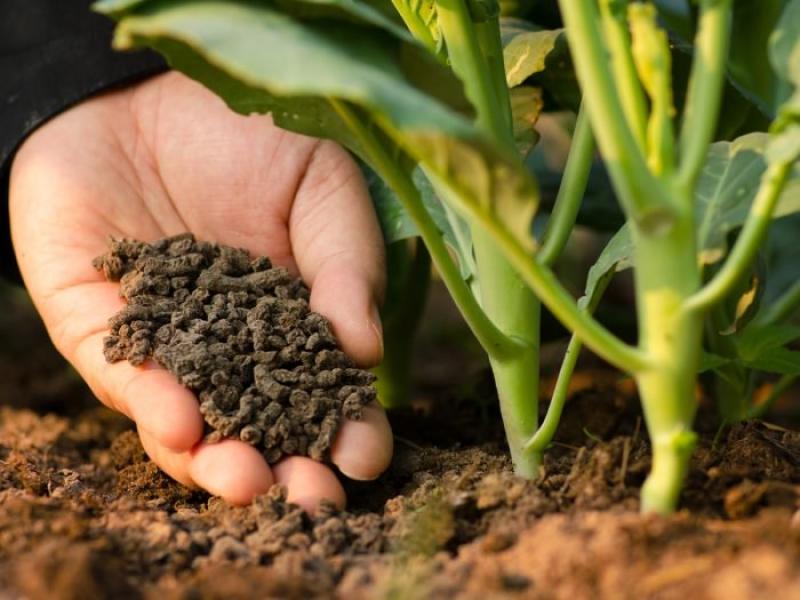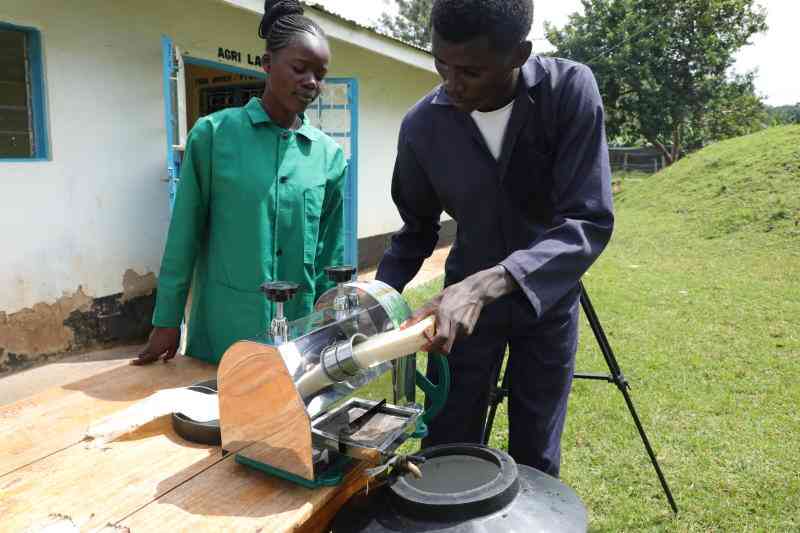Organic vs chemical fertiliser: Which one is suitable?

The Kenya Meteorological Department says the long rains are set to start soon and farmers are busy on their farms. One of the key farm inputs they need is fertiliser.
Today we explore between organic and chemical fertiliser. Andrew Otieno, an organic farming expert, identifies the widespread use of chemical fertilisers as a major cause of soil degradation.
“Chemical fertilisers are not easily broken down. The chemicals, though effective, are only useful for a short time before killing off the land,” he says.
“Second, chemical fertilisers are expensive. They literally enslave the farmer. For example, if you use DAP for planting you must use CAN and/or NPK at some point and every other 2-3 weeks till you harvest. This makes you a slave of the Agrovet.”
He advises farmers to make their own compost and use traditional, organic ways of enriching the soil which are almost cost-free.
Practical solutions
Martin Ndirangu who runs Marchlyn Green Forest Farm in Tetu, Nyeri County grows cabbages, lettuce, broccoli, tomatoes and fruits on his 2.1 acre farm. He swears by organic fertilisers.
“I used to use NPK and CAN from different companies,” he says ruefully, “the results I got from them were not as had been advertised by the companies. Instead my crops experienced stunted growth and yields were extremely low.”
According to Ndirangu, extension officers from the County government conducted soil tests which revealed the soil was exceedingly acidic. This acidity prevented his harvest from meeting expectations. He switched to exclusive use of organic fertilisers.
Today, one and a half years later, he claims his soil has reverted to the correct pH levels and his output has increased by over 20 per cent.
Dr Lucy Wanjiru, formerly of the Agriculture Ministry, poses a question worth considering. “That is all very good”, she says, “but how does one escape the fact that organic fertilisers have low NPK content?”
She argues that due to low nutrient content, organic fertilisers cannot be marketed as such.
“At best, they can be considered as soil amendments,” says Dr Wanjiru.
Davis Kuloba, formerly a sales officer for a large Agrovet distributor, has a decidedly commercial, practical position on the subject.
“Farmers are very intelligent and practical. Their main concern is to maximise returns. It is indeed true that organic fertilisers are important for the soils health, but they are not practical for use on a large scale to boost crop yields. Therefore, the demand for chemical fertilisers will continue to persist”.
Michael Fenske of Missouri State University asserts that organic fertilisers are not effective.
“Chemical fertilisers are quicker and more effective when applied properly as compared to organic fertilisers which have slow release,” he notes. SL Leghari of China Agricultural University concurs with this assesment, adding that organic fertilisers cannot feed the world.
Cheap and easily available
“Chemical fertilisers are cheap and easily available. Furthermore, they have high content of nutrients and can be adapted to supply a specific nutrient like nitrogen or phosphorus. They also release nutrients very fast into the soil. Thus, chemical fertilisers significantly increase yield per unit area,” Leghari says.
Clearly, skeptics and passionate supporters exist on both sides of the debate, and no consensus is likely to be reached any time soon. Dr Bernard Vanlauwe, a senior researcher at the International Institute of Tropical Agriculture (IITA) in Nairobi approaches the debate soberly.
“We shouldn’t be pitting organic against chemical fertilisers. We need to embrace both to meet the colossal demand for food the continent’s growing population requires,” he says.
Dr Vanlauwe notes that while chemical fertilisers provide high amounts of nutrients that plants need to grow strong, organic fertilisers contain organic carbon, which is an essential ingredient of healthy soil. Neither chemical nor organic fertilisers can provide both of these properties on their own.
“Populations are expanding rapidly and farming land is getting more scarce. Farmers simply cannot produce or access sufficient organic fertiliser to feed the world,” he says.
“Chemical fertilisers are responsible for around 50 per cent of the food grown in the world today, and were a key part of the Green Revolution of the 70s and 80s that saved millions from starvation. We cannot deprive farmers of this vital resource,” he notes.
Dr Vanlauwe advocates for knowledge transfer to farmers to empower them with knowledge on how best to integrate organic fertilisers with chemical fertilisers.
Martin Ndirangu of Marchlyn Farm concedes that Dr Vanlauwe is correct that knowledge is critical. Indeed, he took advantage of the training provided by extension officers in his county to introduce new, higher yielding seed varieties into his farm such as potato seeds and green beans, in addition to innovative fertiliser use, which have boosted his returns.
Ndirangu commends the former CEC for Agriculture in the county, Henry Kinyua, for taking a professional approach to the challenge of agricultural production in the County. Under Kinyua, the Ministry spearheaded soil testing in the County which revealed the highly acidic nature of its soils.
As a result, the government distributed free Lime material to the farmers and encouraged them to cut down on the use of chemical fertilisers and enhance adoption of organic fertilisers. Free or highly subsidised chemical fertilisers were also made available to the farmer, but only to be used in combination with Lime and organic inputs, just as suggested by Dr Vanlauwe.
This hybrid approach to the fertiliser problem caused Kinyua to be head hunted by Green Village, an International NGO backed by the Bill and Melinda Gates Foundation, to oversee their efforts to boost agriculture in the East Africa.
Over the last one and a half years, Ndirangu has applied about 300kg of liming material in his farm. This, in combination with compost and manure use, has effectively reversed the acidity of his soil. Now that his farm is fully recovered, he is adamant that he has completely turned away from chemical fertilisers.
“It took long to make my farm healthy again. I will never go back to the tyranny of chemical fertilisers and the unscrupulous businessmen who market them,” he says.
This is despite the arguments by various scientists and experts like Dr Vanlauwe and others that chemical fertilisers will always be needed by humanity.
[email protected]
Want to get latest farming tips and videos?
Join Us
Share this article on social
 The Standard Group Plc is a multi-media organization
with investments in media platforms spanning newspaper print operations,
television, radio broadcasting, digital and online services. The Standard Group
is recognized as a leading multi-media house in Kenya with a key influence in
matters of national and international interest.
The Standard Group Plc is a multi-media organization
with investments in media platforms spanning newspaper print operations,
television, radio broadcasting, digital and online services. The Standard Group
is recognized as a leading multi-media house in Kenya with a key influence in
matters of national and international interest.
 The Standard Group Plc is a multi-media organization
with investments in media platforms spanning newspaper print operations,
television, radio broadcasting, digital and online services. The Standard Group
is recognized as a leading multi-media house in Kenya with a key influence in
matters of national and international interest.
The Standard Group Plc is a multi-media organization
with investments in media platforms spanning newspaper print operations,
television, radio broadcasting, digital and online services. The Standard Group
is recognized as a leading multi-media house in Kenya with a key influence in
matters of national and international interest.







